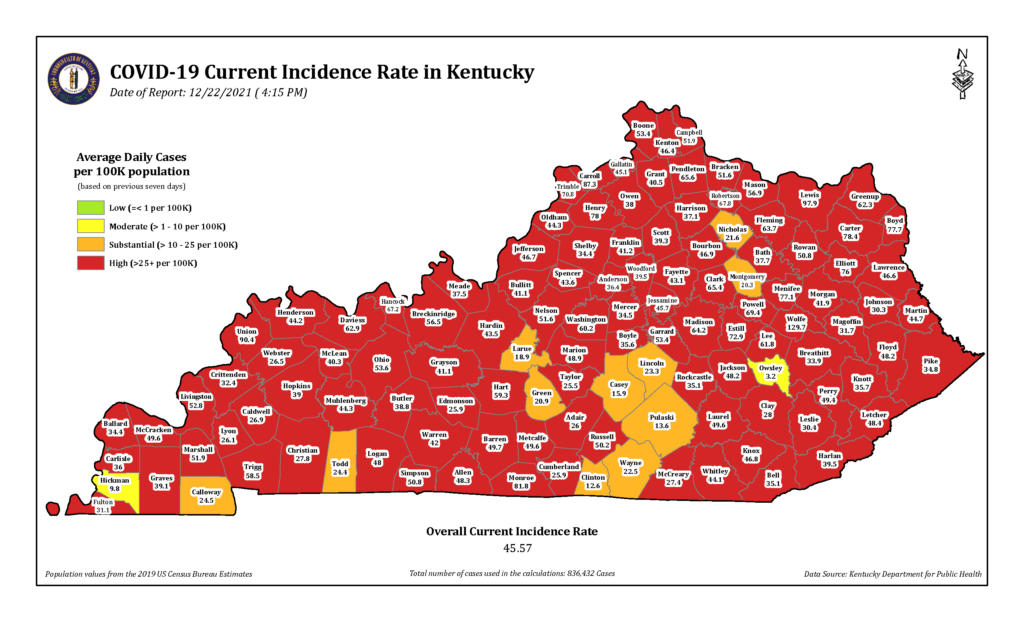At-home pill for Covid-19 is approved but supply is limited; Ky.’s positive-test rate nears 10%; case rate stable

By Melissa Patrick
Kentucky Health News
The good news about the pandemic Wednesday was that the first antiviral pill to treat Covid-19 was granted emergency-use authorization. The bad news was that initially the supply will be limited at a time when demand is expected to soar.
The Washington Post reports, “The Pfizer pill regimen could help meet some of that demand, but it is estimated there will be enough medication through the end of the year for only 180,000 patients, and it is unclear how many of those doses are destined for the United States.”
On Wednesday, the Food and Drug Administration authorized Pfizer’s antiviral pill, Paxlovid, to treat mild-to-moderate Covid-19 in high-risk individuals 12 and older who weigh at least 88 pounds. This five-day treatment is the first antiviral Covid-19 pill authorized to be taken at home. The drug needs to be administered as soon as possible after diagnosis, and within five days of the start of symptoms.
“Today’s authorization introduces the first treatment for Covid-19 that is in the form of a pill that is taken orally — a major step forward in the fight against this global pandemic,” Dr. Patrizia Cavazzoni, director of the FDA’s Center for Drug Evaluation and Research, said in the news release. “This authorization provides a new tool to combat Covid-19 at a crucial time in the pandemic as new variants emerge and promises to make antiviral treatment more accessible to patients who are at high risk for progression to severe Covid-19.”
“Last week, Pfizer released updated results that showed the treatment cut the risk of hospitalization or death by 89% if given to high-risk adults within a few days of their first symptoms. If given within the first five days of symptoms, the efficacy was similar: 88%,” CNN reports.
Merck has also requested emergency-use authorization for its antiviral pill, molnupiravir, but the FDA has not yet authorized the treatment.
At a Saturday news conference, state Health Commissioner Steven Stack cautioned Kentuckians to not count on such treatments to protect them against Covid-19, pointing to an expected limited supply of the antiviral pills that will also come with restrictions. Instead, he said, the best plan to protect yourself against Covid-19 right now is to get a vaccine or booster as soon as you are eligible.
So far, 2.7 million Kentuckians, or 62% of the total population, has received at least one dose of a vaccine; 2.4 million, or 54% of the total population, are fully vaccinated; and 788,022, or 18% of the total population, has been boosted.
Daily report: Kentucky reported 2,913 more coronavirus cases Wednesday, raising the seven-day average unchanged at 2,270 per day. The share of Kentuckians testing positive for the virus in the last seven days continues to rise, to 9.61%. That’s up from 9.33% Tuesday and 8.77% a week ago.
Kentucky hospitals reported 1,210 Covid-19 patients; 327 of them in intensive care; and 185 on mechanical ventilation.
Nine of the state’s 10 hospital readiness regions are using at least 80% of their intensive care unit capacity, with six above 90%.
The state’s daily infection rate is 45.57 cases per 100,000 residents. Counties with rates more than double that rate were Wolfe, 129.7; and Lewis, 97.9. Kentucky’s infection rate ranks 20th among the states, according to The New York Times.
Ninety percent of the state’s counties are red on the state infection map, for counties with more than 25 cases per 100,000 people, considered a high level of transmission.
The state reported 36 more Covid-19 deaths, bringing its pandemic death toll to 11,918.